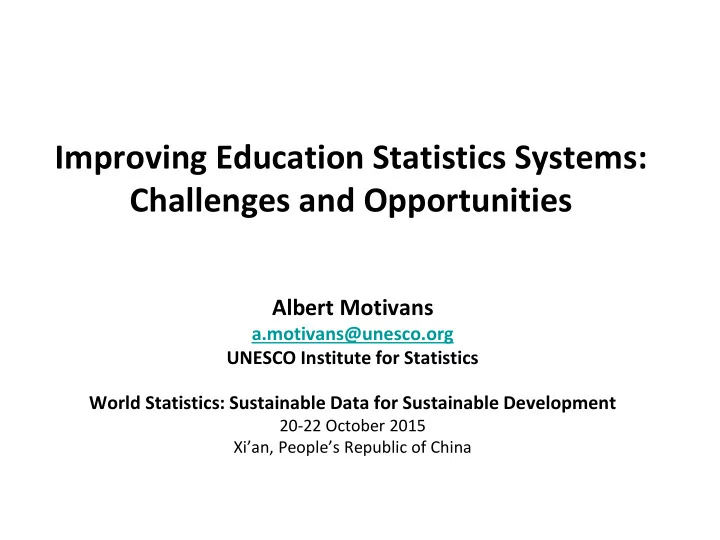

Improving Education Statistics Systems: Challenges and Opportunities Albert Motivans a.motivans@unesco.org UNESCO Institute for Statistics World Statistics: Sustainable Data for Sustainable Development 20-22 October 2015 Xi’an, People’s Republic of China
Do we have systems to monitor the education SDGs? MDGs SDGs all disaggregated • Universal primary • Primary and secondary education and outcomes education • Early childhood development • Gender parity in • TVET and tertiary education and outcomes education • Skills for work • Global citizenship and education for sustainable development • Education equity (gender, disadvantaged groups) • School environments • Scholarships • Teachers
Education data eco-system Lack of systemic approach/integration Administrative data (EMIS): students, Assessment teachers, financing data: pupil performance Data quality issues, and selection, e.g.coverage across govt. Household units, private sector adult skills surveys and System level Limited disaggregation census data Limited outcome information Mainly for basic measures education (rules and Limited disaggregation Little use of data norms) Fragile capacity Lack of harmonisation across national surveys
Data quality: what is the starting point? Efficient use of Validity resources and reliability Consistency over Relevance to time policy Accessibility and Potential for affordability disaggregation Comparability Timeliness and through punctuality standards Coherence Clarity and across sources transparency Completeness
Assessing data quality • Purpose – to improve the process and outcomes of data system – To understand current situation – To link toward link to a specific action/programme • International tools (based on IMF) – Education DQAF and family of assessment tools (UIS) – SABER EMIS (World Bank) • Good practices – The assessment should be country driven and owned – The assessment must be linked to an action plan and resources
Strengthening national capacity to implement data quality reviews • Establish pool of regional experts and support Community of Practice in order to: – conduct education DQAF studies – promote South-South cooperation to share knowledge, experience and expertise – develop relevant training materials, – organize technical workshops to enhance skills and experience of country teams
A way forward? “…call for a data revolution for sustainable development, with a new international initiative to improve the quality of statistics and information available to citizens. We should actively take advantage of new technology , crowd sourcing , and improved connectivity to empower people with information on the progress towards the targets.” - High Level Panel
Big data and education monitoring • Potential for integrating data sources • Link multiple sources through the use of common identifiers for individuals, households, schools • For instance, linking socioeconomic data on households to: – to schools for children and youth – results from student assessments
Advancing the agenda • For each data source – Reach consensus on survey methods – Field trials – Training in use of data – Policy dialogue to ensure sustainability – And others • Consider a limited number of steps • Fixed sources, fixed steps, known input costs • Process can be more achievable
Country-level requirements • Existence of demand – many efforts to improve data are from the supply side, and many are not sustained • Where demand is not part of the process, then capacity building and supply- side ideas won’t take hold • In many cases there is some demand, but limited… but this can be a starting point
Conclusions • New pressures, challenges, and opportunities • To sustain it, requires mapping the starting points, identifying gaps and developing technical capacity, demonstrating effects and collaboration • Demand is a vital pre-condition
Recommend
More recommend